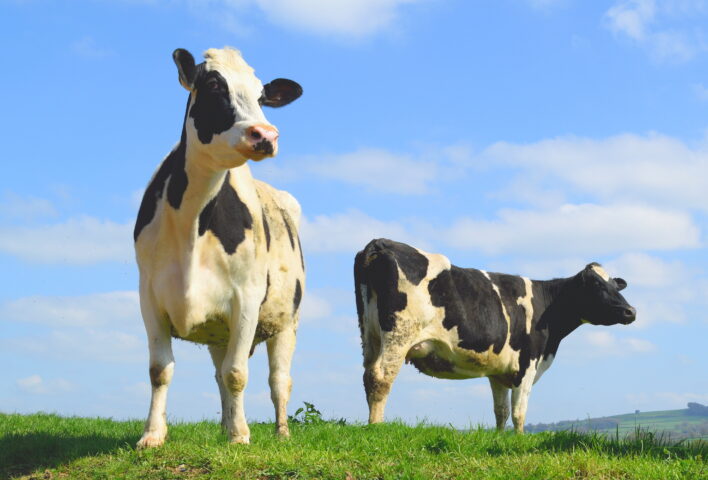Is a 'slaughter-free milk production system’ possible?
Richard McIlwain, Chief Executive of the Vegetarian Society, outlines why we are launching our Slaughter-Free Dairy Appeal, our bold new campaign to end the suffering of dairy cows.

The issue that probably causes most debates between vegetarians and vegans, is dairy – with the oft-repeated claim that the dairy industry is really a meat industry. Which, if we are honest, it is, given that once the dairy cow is no longer productive, at around five years old, it follows the well-worn path of many other farmed animals to the abattoir. The meat is then sold as beef.
But the issue that features most in debates is the fate of male calves born to dairy cattle. Stories of farmers shooting male calves after birth abound on the internet, however, it appears that this practice is diminishing. An article for Farmers Weekly in December 2020 indicated the dairy industry had committed to ending the practice in 2023. The same article goes on to highlight the increasing use of sex-sorted semen when artificially impregnating cows, reducing the incidence of male calf births to around 10%.
However, the story does not end there for those male calves, as they go on to live very short lives, being raised indoors for rose veal and slaughtered at around eight months. Here at the Vegetarian Society, we have placed the rights and welfare of animals at the heart of our messaging since 1847. The underlying cruelty within the dairy industry is something we must address head on if we are to be taken seriously as a campaigning organisation. It is not something we can stay silent on.
There is, of course, the option of going vegan. A good number of our members are already vegan, and eradicating dairy from your diet does mean you are no longer personally contributing to a less than perfect dairy industry.
But I believe there is another equally compelling route. One that puts the needs of the dairy cow at the heart of milk production, not simply profit. One that views the dairy cow in the same manner in which we view our companion animals, and puts their welfare on an equal footing. A philosophy which doesn’t seek an end to all animal exploitation, but instead recognises the intrinsic value in shared human and animal experience and looks to build on it – but in a new and compassionate way.
In seeking to explore this issue further, with a view to mapping out how we might approach it, I paid a visit to the ISKCON Temple (International Society for Krishna Consciousness) just outside Watford, together with the wonderful Asa Kaur from the International Vegetarian Union.
The grounds and the temple itself are beautiful and were gifted to the Hare Krishna movement by George Harrison in 1973. Indeed, our very own patron Sir Paul McCartney spent a lot of time there throughout the 1970s.
But primarily I went to find out more about the New Gokul Centre for Cow Protection. Here 63 cattle are looked after and cared for in a way that would be alien to the modern industrial dairy farmer. The cows are introduced to one of two bulls on site only once every three years. The calves are left to wean from their mothers for six months. Males are raised as oxen to do work around the farm. Females are hand milked each day. They provide milk for up to 15 years, living out their final years in retirement, with the milk used on site within the temple. No animal is slaughtered. And the oldest cow on site is 20 years old.
The cow is sacred within the Hare Krishna movement (as indeed it is within other religions primarily stemming from a Hindu tradition) and this was evident in the care and kindness shown to the animals.
I was keen to understand more and particularly whether this was a model that other dairy farms could follow. There is, of course, a world of difference between a sanctuary raising 63 cows and producing milk solely for use within the temple, and a commercially viable modern dairy farm.
If we were to immediately propose this as a way forward, you can hear the immediate retorts:
“You’ll never produce enough milk to make it commercially viable.”
“Your milk will be too expensive.”
“No one will buy it – and if they do it will be the preserve of the wealthy.”
“You will fill the landscape with lots of unproductive male cattle and retired
females.”
“Imagine the methane emissions from all these unproductive cattle.”
But if we believe wholeheartedly that change is needed then we should let nothing stand in our way. It is the job of our charity to think the unthinkable and challenge the mainstream, in the spirit of those brave 1847 pioneers who took a stand for animals and were often ridiculed in return by mainstream society.
Indeed, there is already a dairy farm operating commercially along these lines.
Scaling up to create a national ‘slaughter-free’ industry may require some compromise… but at the moment, we simply don’t know. However, this whole area does offer rich avenues for research and innovation, which is why we’re embarking upon this journey with our Slaughter-Free Dairy Appeal.
You can bring about permanent change to the way cows are cared for and help change the dairy industry for the better, forever.
Please donate today by going to: www.vegsoc.org/sfda
